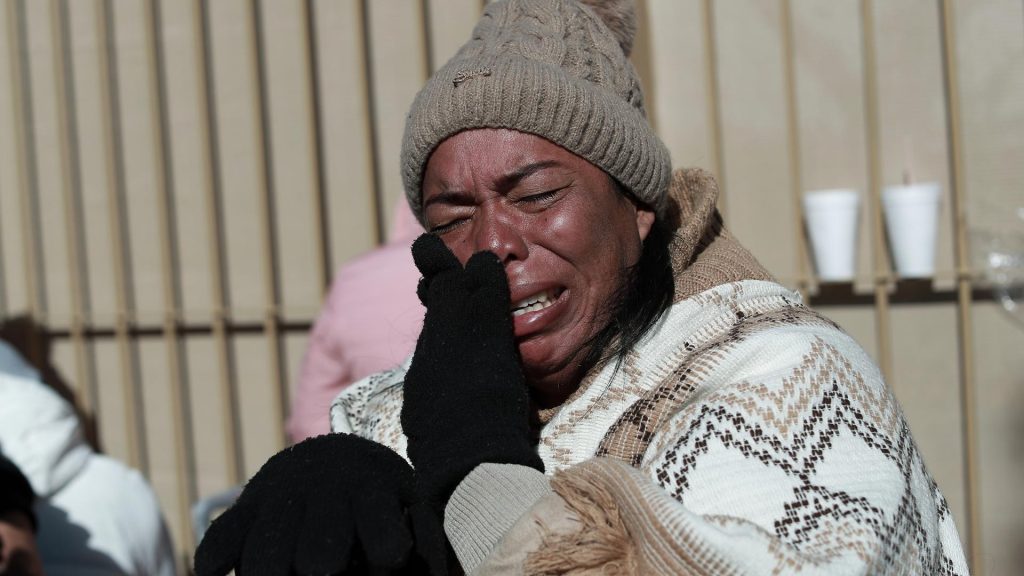Tens of thousands of appointments were canceled when Trump took office.

Credit: Christian Chavez, AP
TIJUANA, Baja California — Migrants from Haiti, Venezuela, and around the world, hauling small rolling suitcases packed with clothes and toys for their children, stood at the U.S.-Mexico border, clutching their phones. After months of waiting, they had finally secured appointments to legally enter the United States. But just moments after President Donald Trump took office, their hope turned to despair.
U.S. Customs and Border Protection (CBP) announced that the CBP One app, which had facilitated the entry of nearly 1 million people since January 2023, would no longer be used to schedule appointments for asylum seekers. As a result, tens of thousands of appointments—some scheduled as far as February—were abruptly canceled, with no recourse or way to appeal.
For many, including those waiting at the border in Tijuana, the news hit hard. Maria Mercado, whose family had an appointment at 1 p.m., four hours too late, struggled to hold back tears as she read the cancellation notice on her phone. “We don’t know what we are going to do,” she said, standing just across from the United States, unsure of the next steps.
Mercado, who fled Colombia decades ago due to drug cartel violence, had moved to Ecuador, then Mexico, before making the difficult journey north. She wasn’t asking for much, just for a chance to reach the U.S. “I’m asking God to please let us in,” she said.
Around her, other migrants hugged each other or stood silently, unsure of what to do next. Nearby, a sign urged people to get the CBP One app, promising it would “facilitate your processing,” even as the system was abruptly shut down.
The CBP One app had become an essential tool for many migrants, particularly Venezuelans, Cubans, Haitians, and Mexicans, helping them secure one of the 1,450 daily appointment slots at eight border crossings. But now, with the app offline, many were stranded at the border or deeper in Mexico, facing an uncertain future.
Jairol Polo, 38, a Cuban migrant, had waited six months for an appointment. He flew from Mexico City to Matamoros, across from Brownsville, Texas, only to learn upon arrival that his appointment had been canceled. “Imagine how we feel,” he said, visibly dejected, as he smoked a cigarette at the border.
For some, the news wasn’t immediately devastating. Andrum Roman, a 28-year-old Venezuelan, was in the final group to cross the border at Ciudad Juarez, across from El Paso, Texas. “We’re a little safer now because we’re here,” he said, shortly before handing his documents to U.S. authorities. “But you still don’t know what’s going to happen.”
Another Venezuelan, Rober Caruzi, followed closely behind. “I reached the border twice and was sent back twice, but I didn’t lose hope,” he said.
By the afternoon, the app was completely down, marking the end of a critical tool for managing the flow of migrants.
CBP One, introduced by the Biden administration, functioned as a kind of lottery system for entry, offering legal parole for migrants—a power granted to the president under a 1952 law. It quickly became a crucial part of the Biden administration’s strategy to balance border enforcement with legal pathways for asylum seekers. Critics, however, saw it as a magnet for migrants, particularly as Trump had promised to end such measures during his campaign.
Despite a rocky start in January 2023, CBP One had played a significant role in reducing illegal border crossings, offering a regulated alternative to the often-chaotic situation at the border. But with its sudden cessation, many migrants in shelters across Mexico—where people had been checking their phones daily in hopes of securing an appointment—are now left in limbo. U.S. Customs and Border Protection says about 280,000 people try daily for one of the 1,450 available slots.
The end of CBP One is also tied to the revival of the “Remain in Mexico” policy, a key part of Trump’s first-term border strategy. This policy requires asylum seekers to wait in Mexico for U.S. immigration court hearings, affecting roughly 70,000 individuals.
Matthew Hudak, a retired deputy chief of the Border Patrol, warned that the end of CBP One could push more migrants to attempt illegal crossings. “For that to be meaningful,” Hudak said, referring to the app’s shutdown, “there has to be some level of consequence if you bypass any lawful means and are doing it illegally.”
The sudden news of the app’s termination was a shock to migrants across Mexico. Juan Andrés Rincón Ramos, a 19-year-old Venezuelan, had been overjoyed in early January when he finally secured an asylum appointment after months of effort. He had spent five years living in Peru and seven months in Mexico, hoping to join his brother in Pittsburgh. But his hopes were dashed when he learned his appointment had been canceled. “It was a moment of hope, but it didn’t last,” he said, standing in a makeshift migrant camp in Mexico City. “Everyone trusted in the American dream, but we were all wrong.”
As the app’s sudden disappearance leaves so many without answers, the future remains uncertain for the thousands of migrants still waiting at the border, their hopes for a new life in the United States fading with each passing moment.




